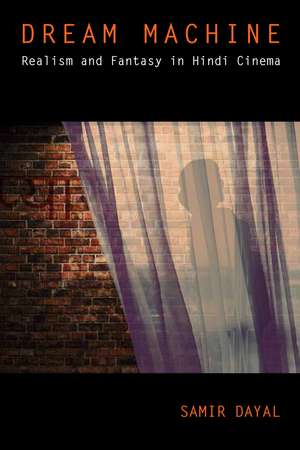Dream Machine: Realism and Fantasy in Hindi Cinema
Autor Samir Dayalen Limba Engleză Paperback – 4 aug 2015
Popular Hindi films offer varied cinematic representations ranging from realistic portraits of patriotic heroes to complex fantasies that go beyond escapism. In Dream Machine, Samir Dayal provides a history of Hindi cinema starting with films made after India’s independence in 1947. He constructs a decade-by-decade consideration of Hindi cinema’s role as a site for the construction of “Indianness.”
Dayal suggests that Hindi cinema functions as both mirror and lamp, reflecting and illuminating new and possible representations of national and personal identity, beginning with early postcolonial films including Awaara and Mother India, a classic of the Golden Age. More recent films address critical social issues, such as My Name is Khan and Fire, which concern terrorism and sexuality, respectively. Dayalalso chronicles changes in the industry and in audience reception, and the influence of globalization, considering such films as Slumdog Millionaire.
Dream Machine analyzes the social and aesthetic realism of these films concerning poverty and work, the emergence of the middle class, crime, violence, and the law while arguing for their sustained and critical attention to forms of fantasy.
Dayal suggests that Hindi cinema functions as both mirror and lamp, reflecting and illuminating new and possible representations of national and personal identity, beginning with early postcolonial films including Awaara and Mother India, a classic of the Golden Age. More recent films address critical social issues, such as My Name is Khan and Fire, which concern terrorism and sexuality, respectively. Dayalalso chronicles changes in the industry and in audience reception, and the influence of globalization, considering such films as Slumdog Millionaire.
Dream Machine analyzes the social and aesthetic realism of these films concerning poverty and work, the emergence of the middle class, crime, violence, and the law while arguing for their sustained and critical attention to forms of fantasy.
Preț: 219.67 lei
Nou
Puncte Express: 330
Preț estimativ în valută:
42.04€ • 45.65$ • 35.31£
42.04€ • 45.65$ • 35.31£
Carte tipărită la comandă
Livrare economică 22 aprilie-06 mai
Preluare comenzi: 021 569.72.76
Specificații
ISBN-13: 9781439910641
ISBN-10: 1439910642
Pagini: 318
Dimensiuni: 152 x 229 x 23 mm
Greutate: 0.45 kg
Editura: Temple University Press
Colecția Temple University Press
ISBN-10: 1439910642
Pagini: 318
Dimensiuni: 152 x 229 x 23 mm
Greutate: 0.45 kg
Editura: Temple University Press
Colecția Temple University Press
Recenzii
“Dayal does an excellent job of bringing together diverse films, theorists, and critics on such issues as cosmopolitanism, secularism, terrorism, gender, and sexuality, often linking his analyses with contemporaneous historical events to provide fuller context. The most exciting aspect of Dream Machine is its new engagement of psychoanalytic theories of fantasy and the production of ‘Indianness’ in transnational Bollywood cinema. This is a fascinating book.”—Kavita Daiya, Associate Professor of English at George Washington University
“Dayal’s writing is bright and supple, and his reading of films is consistently interesting and entertaining. The meshing of realism and fantasy in prominent Bollywood films and genres argues that the fantasy elements are integral to imagining ‘Indianness’ over a range of interruptions that trouble a coherent national identity. Dayal avers that fantastic imagination is far more than mere escapism. A very engaging, rewarding project and a solid scholarly book, Dream Machine is also an interesting read for the non-expert cinephile.”— Henry Schwarz, Professor of English at Georgetown University
Notă biografică
Samir Dayal is a Professor of English and Media Studies at Bentley University in Massachusetts. He is the author of Resisting Modernity: Counternarratives of Nation and Masculinity in Pre-Independence India; a co-editor, with Margueritte Murphy, of Global Babel: Questions of Discourse and Communication in a Time of Globalization; and the editor of the Cultural Studies Series, which includes Julia Kristeva’s Crisis of the European Subject.
Cuprins
Acknowledgments
Introduction • Mirror and Lamp
I Postcolonial Hindi Cinema: Bad Subjects and Good Citizens
1 The Wish to Belong, the Desire to Desire: The Emergent Citizen and the Hindi “Social” in Raj Kapoor’s Awaara
2 A Bad Son and a Good Enough Mother? The Paradoxical Maternal Romance in Mehboob Khan’s Mother India
3 Sexploitation or Consciousness Raising? The Angry Man, the Avenging Woman, and the Law
II Reimagining the Secular State
4 Terrorism or Seduction
5 Patriot Games, Unpatriotic Fantasies
III Diasporic Cinema and Fantasy Space: Nonresident Indian Aliens and Alienated Signifiers of Indianness
6 The Powers of the False: Fantasy Spaces for Same-Sex Love?
7 The New Cosmopolitanism and Diasporic Dilemmas: Rehabilitating the “NRI”
8 Poverty Porn and Mediated Fantasy in Danny Boyle’s Slumdog Millionaire
Conclusion • Transnational Translations: Mobile Indianness
Notes
Bibliography
Index
Introduction • Mirror and Lamp
I Postcolonial Hindi Cinema: Bad Subjects and Good Citizens
1 The Wish to Belong, the Desire to Desire: The Emergent Citizen and the Hindi “Social” in Raj Kapoor’s Awaara
2 A Bad Son and a Good Enough Mother? The Paradoxical Maternal Romance in Mehboob Khan’s Mother India
3 Sexploitation or Consciousness Raising? The Angry Man, the Avenging Woman, and the Law
II Reimagining the Secular State
4 Terrorism or Seduction
5 Patriot Games, Unpatriotic Fantasies
III Diasporic Cinema and Fantasy Space: Nonresident Indian Aliens and Alienated Signifiers of Indianness
6 The Powers of the False: Fantasy Spaces for Same-Sex Love?
7 The New Cosmopolitanism and Diasporic Dilemmas: Rehabilitating the “NRI”
8 Poverty Porn and Mediated Fantasy in Danny Boyle’s Slumdog Millionaire
Conclusion • Transnational Translations: Mobile Indianness
Notes
Bibliography
Index




